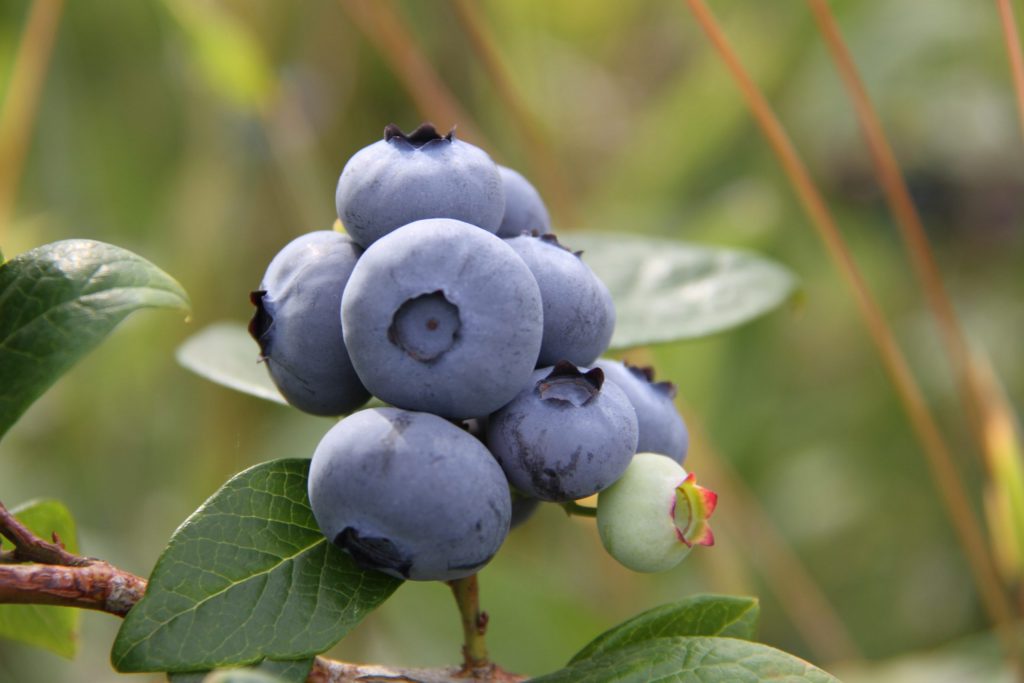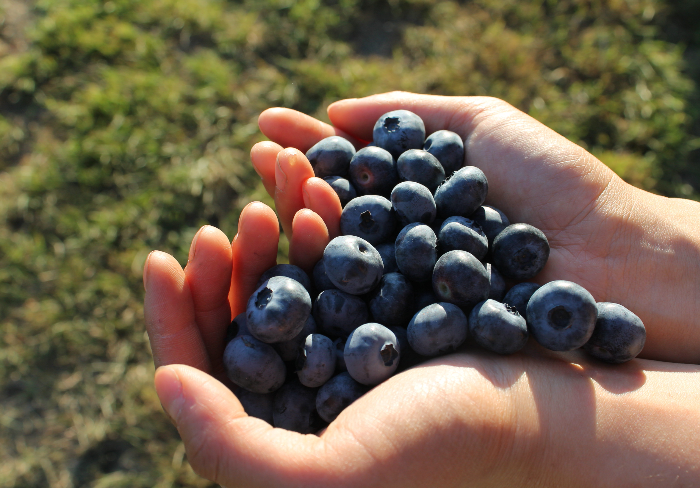
You might think that growing up on a blueberry farm would make you sick of eating blueberries. Thankfully for me, the opposite is true. I am absolutely spoiled with the freshest fruit, right off the bush. Blueberries truly are nature’s candy, BUT they come with so many great health benefits! If you didn’t already know, the blue in the blueberry provides these excellent health impacts on your body.
Do you struggle with high blood pressure?

Research shows that just half a cup of blueberries (fresh or frozen) can significantly improve cardiovascular health. In general, just two hours after consuming blueberries, the researchers could see positive health benefits in the patients.
A study, performed on post-menopausal women, demonstrated that just 8 weeks of eating 1 cup of blueberries per day caused a 7 point drop in systolic and 5 point drop in diastolic blood pressure. Another study looked at cholesterol levels dropping by 30% in children, that have a genetic disorder causing high cholesterol, with consistent consumption of blueberry tea.
The blue pigment in blueberries are called anthocyanins, and they are responsible for the improved blood circulation by supporting the health of our blood vessels. Who wouldn’t want healthy functioning arteries, and therefore a healthy functioning heart.
Worried about healthy aging?
Here is that word you always hear when we talk about anti-aging: antioxidants. And its for good reason! Oxidation is literally a process that harms the body and leads to multiple illnesses. The anthocyanins in blueberries are known to increase the antioxidants in our bloodstream for 5 hours after consumption, which means they fight the oxidation process for a really long time.
1 cup of blueberries a day is seen to improve cognition in the elderly and in children. This is particularly important for the elderly population as the antioxidants combat the effects of age-related neurodegeneration, which leads to Alzheimer’s and Parkinson’s disease. As a result, studies see these powerful berries counter the effects of age-related decline, mobility, and DNA damage.
Please note that the blueberries’ function is NOT effective when eaten with dairy, unfortunately, the nutrient absorption is blocked and causes less antioxidant capacity. Sorry, no more berries with ice cream!

Do you struggle with constipation?
Are you sick of people telling you to eat more fiber? Well did you know that this tasty fruit is also a good source of fiber? There is just as much fiber in blueberries as in spinach or broccoli on a gram per gram basis. Not to say you shouldn’t eat your veggies of course.
We know that dietary fiber shows a significant advantage over placebo in terms of stool frequency. Blueberries provide the bulking material required for a healthy stool, and they also increase the number of healthy bacteria in the human gut as a probiotic. This strain of bacteria supports a beneficial composition of intestinal microbiota for healthy digestion. Fibre also helps to reduce your cholesterol and balance your blood sugar, which prevents disease such as type 2 diabetes; bonus!
Trying to Lose Weight?
Don’t be fooled by the sweet taste of blueberries into thinking that they are not a healthy snack. Blueberries are a low calorie and nutrient-dense food that doesn’t deserve any guilt for eating. I always believed that a portion of quality food will help you feel fuller without needing to eat as much as a cheaper, processed food.
Sugar and flour are major culprits in our current obesity epidemic. Sugar in high quantities have poor effects on our metabolism and increase the inflammation in the body. This makes it very difficult to lose weight and fight sugar cravings. As I mentioned, blueberries are excellent for balancing our blood sugar levels, making it easier to manage our cravings. It helps prevents diseases like type 2 diabetes because insulin resistance can be diminished with these awesome anthocyanins.
Blueberries also modulate inflammation with its antioxidant activity, thus protecting our metabolism, lowering the stress occurring on a cellular level, and even improve symptoms of pain.

Looking for a Natural way to Boost you Mood?
Since we discussed how blueberries improve our cognitive function, our mental process of acquiring and understanding information, its no wonder that they can also support our mood. Berries can actually enhance beneficial signaling in the brain; 2 cups of blueberries per day significantly improved a study group, allowing them to feel more enthusiastic, alert, inspired, and attentive.
As circulation is improved, there is also improved blood flow to areas of the brain with blueberry consumption. This dietary intervention could be great in promoting positive mood and preventing dysphoria and depression. Anxiety and depression are often correlated with neuron signaling in the brain. As blueberries support brain health, neuron signaling is actually supported and may explain observations of a more positive mood.
If you have been diagnosed with a more severe health condition, please consult with a healthcare practitioner about how you can complement your current therapy with nutritional support.
I hope this list has given you even more reasons to enjoy your blueberries and live a more fruitful life!

Sources Cited:
Ucar SK, Sözmen E, Yıldırım HK, Coker M. (2014) Effect of blueberry tea on lipid and antioxidant status in children with heterozygous familial hypercholesterolemia: pilot study, Clinical Lipidology, 9:3, 295-304.Miller MG, Hamilton DA, Joseph JA, Shukitt-Hale B. Dietary blueberry improves cognition among older adults in a randomized, double-blind, placebo-controlled trial. Eur J Nutr. 2018;57(3):1169-1180.
